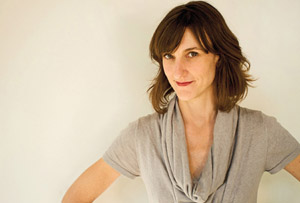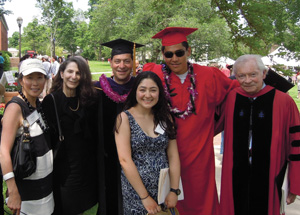HELPING KIDS DO ‘THE WORK OF GROWING UP’: STACEY MATTHIAS ’92

As those of us who have done it know, growing up isn’t for wimps. The path from infant to adult is strewn with confusion, mistakes, triumphs, and pain of many varieties, from skinned knees on the playground to the bruising dramas of unrequited high school crushes.
That’s why Stacey Matthias ’92 sees her mission as helping kids do “the work of growing up.” As founder and co-CEO of Insight Strategy Group, a research-driven strategy firm in New York City, Matthias works with companies like Nickelodeon, National Geographic, MTV, Dreamworks, Universal Studios, and Hasbro to inform the development of entertainment and play experiences that tap into the challenges children are coping with as they navigate the shoals of youth. Sarah Chumsky ’89, a friend, colleague, and fellow alum, leads the InsightKids division with “searing insight and a strong moral compass.”
“Children are hardwired to learn and develop,” Matthias says. “There is a developmental engine that lives in kids that motivates them to constantly explore and rehearse ideas that they need to master in order to move to the next stage of their development.”
So, for example, older children experiencing complex friendships will be attracted to stories that feature the “rupture and repair of relationships, so they can practice this in theory before or while they’re practicing it in real life,” says Matthias. Little kids on the cusp of greater independence might like stories about moving from danger to safety, from feeling overwhelmed to feeling secure. “Kids are attracted to characters and stories helping them do the work they’re doing in their own lives.”
Matthias grew up with a father whose job as a field engineer took the family all over the country for projects that lasted as little as three months and occasionally as long as a year or two. Her mother, raised by a father in the airline industry, continued the tradition of making and remaking the family home in all corners of the country. Traveling from town to town in a Volkswagen bus—the family had sojourns in Vidalia, Ga.; Schenectady, New York; Denver, Colo.; and “somewhere in Rhode Island,” among other places— Matthias switched homes and schools as often as some kids changed their sheets.
This nomadic existence helped her sharpen the powers of observation she now relies on for the anthropological elements of her work. “When I was settling into new schools, I had to decode the social environment in each place,” she says. Even seemingly small cues, like whether students rolled up their jeans or not, made a difference in understanding the power dynamics and social structures of her classmates and determining where she fit in.
Matthias majored in philosophy and government at Wesleyan after her mind was “blown” by a course with philosophy professor Victor Gourevitch, comparing the work of Aristotle and Hegel. Through reading and comparing the two thinkers’ original texts, she gained an appreciation for the logic behind the very different but very coherent worldviews expressed by each. “It was like weight training for my brain,” she says.
After college, Matthias developed educational software for a small company. But she found herself tripped up by her own questions about what would compel real kids’ curiosity. For instance, would they understand the metaphor of a museum? Would they find it interesting or a big snore?
Those questions motivated her to move into research-oriented work, first studying how humans interact with computers, and ultimately focusing on child development under the tutelage of developmental psychologist Michael Cohen. Matthias likens her interest in how kids learn and grow to her experience in that mind-blowing philosophy class.
“There is a parallel between child development and philosophy,” she adds. “Understanding how a child’s mind works is very much like reading a philosophical text. It’s like a whole other worldview, where you ask, what can they understand, what do they know or not know? How do they experience the world?”
To answer those questions for clients, Matthias and her team—which sometimes includes her husband and co-CEO, Boaz Mourad—observe children at play, conduct focus groups, design surveys, and review the academic and popular literature about relevant issues.
An assignment that remains formative for Matthias was one of her first: testing Nickelodeon’s SpongeBob SquarePants television show in the late 1990s. “We did an early test with kids to see if they liked it and what they liked about it, to help Nickelodeon decide if they’d pick up more seasons. To this day I’m struck by how much energy there was in the room. There was a joy and giddiness and exuberance in the conversations about this kitchen sponge that lived under the sea.”
In analyzing the reaction, Matthias says SpongeBob represented a new kind of adult male entertainment figure. Unlike the action stars or superheroes of past cartoon shows, SpongeBob was “vulnerable and silly, showed a lot of emotion, made mistakes,” she says. “He filled an emotional gap in pop culture about a different way to be a guy. It opened up the lens and captured more of what boys and girls actually experience of the men in their lives. ” Such insights helped Nickelodeon commit to the show, which has now been on the air for more than a decade.
Insight’s work allows Matthias to view the current culture wars over parenting and childhood with equanimity. Helicopter parents, attachment parenting, free-range kids… these concepts are fodder for endless, and often hysterical, discussion on playgrounds and blogs. Matthias puts these debates in historical perspective. Whereas adults of her parents’ generation remained in the center while kids orbited around them—witness how she was schlepped around the country in deference to her father’s job—many Gen-X parents put their children at the center of the family universe.
She sees that changing now, as twenty-something Millennials—used to running the show as children—begin to procreate and refuse to give up their own identities simply to be parents. “We try not to make the mistakes our parents made, so we make different ones,” says Matthias. “Humans aren’t perfect so there isn’t a perfect way to parent. I just try to focus in on the meaning of how we’re parenting now.”
Matthias has a mini-laboratory in which to examine these issues at home, where her two daughters, Eden (12) and Gaia (8), provide her with constant insight into child development. But then again, Matthias says, “As a researcher, everything is a mini-laboratory. Sitting in an airport because of a delayed flight is also a lab, because you can watch people, see how they behave and wonder ‘what’s driving them to do what they do?’”

